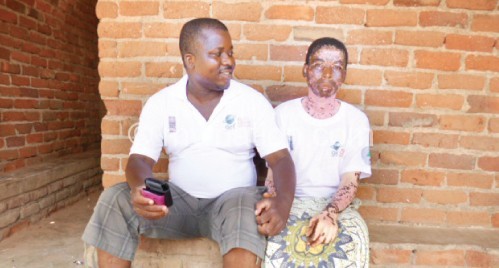Rough ride for woman with illness

Mercy Seda, 23, from Mtseka Village in Traditional Authority (T/A) Ngabu in Nsanje has had a painful experience of discrimination because of her illness.
Due to vitiligo, a condition that causes de-pigmentation of parts of the skin, Mercy has suffered physiological, mental and physical torture at the hands of people she should have otherwise interacted with freely in her community.
With a clear pink colouration that has evidently taken over her normal dark brown complexion for a good part of the body, it is clear to understand the young woman’s predicament as she narrates her story, almost resigned to her fate.
Medicine defines vitiligo as the skin discoloration that occurs when cells responsible for skin pigmentation, known as melanocytes, die or are unable to function.
Worse still, at the onset of her condition when she turned 10, community and family members believed she was a victim of a spell that had befallen. She too has grown up believing she was bewitched as a look in the mirror was all the confirmation she needed
“During my childhood, we used to go to the river and take baths with friends. But they would not take baths downstream when it was me who was upstream. They said I contaminated the waters. Even at Dinde Primary School, I was forced to drop out in Standard Six primarily because nobody wanted to interact with me or sit next to me in the classroom. I felt like I was in my own world; a world in a vacuum with no one to socialise with. It was very painful.
“However, I did not give up. I had hope that society would understand and accommodate me when I grew up. But, alas, I had no refuge. Even in my 20s, people shunned me. They looked at me as an intruder when I wanted to participate in community development activities. If I chose to join those cooking food for community functions, then know for sure that they will mark what I prepared and will not eat it,” she narrated.
Mercy, a divorced mother of two, can hardly take care of her children since the husband left her owing to her condition.
“I was surprised to see him do that because he married me while I had already developed this condition. He could caustically and sarcastically talk about my patches. But my worry is how to feed my children since I cannot stand extreme weather conditions and work. You know Nsanje is a very hot district, yet I have to hoe every day. I wish I had capital to invest in some income generating activity or if I could get some technical training such as tailoring,” said Mercy.
According to Dr. Medison Matchaya of Nsanje District Hospital, the cause of vitiligo is unknown but research suggests that it may arise from autoimmune, genetic, oxidative stress, neural or viral causes.
“Autoimmune causes are the most widely accepted and it is when the antibodies mistakenly identify the melanocytes as foreign objects, hence the destruction or malfunction of the same. Vitiligo can be segmental or non-segmental (affecting the whole body) and can be mistaken for albinism. Nevertheless, there are ways to slow down the hyper-activeness of the immune system. There is also need to prevent further damage by making sure the patient wears sun cream and clothes that will cover the whole body, including a hat,” said Matchaya.
Tiphedzane is a non-governmental organisation (NGO) working in the area which has fought tooth and nail to free Mercy from the cocoon she was forced into.
Under the auspices of Tiphedzane, Mercy can now attend community meetings without raising eyebrows, can now cook and everyone eat without excluding food cooked by her and, above all, she is a member of the Village Forestry Authority (VFA).
Executive director of Tiphedzane Mike Dansa said they have been working with UNDP’s Global Environmental Fund (GEF) whose mainstreaming is the fight against discrimination.
“Our organisation heard about her when we visited the village as we implemented a climate change project in the area. We deliberately included her in the VFA and Village Natural Resources Management Committee [CBNRMC].
“Whenever we conduct trainings, we do not leave her out. We then embarked on a campaign against all forms of discrimination in the area. Since then, the community interacts with Mercy the way they do with any other member of the community. As Tiphedzane, we are going to link her to relevant institutions for the necessary support,” said Dansa.
He urged other organisations to be sensitive of all forms of discrimination in communities.
Today, Mercy looks at home with the people who initially shunned her with renewed glimmer in her eyes.





